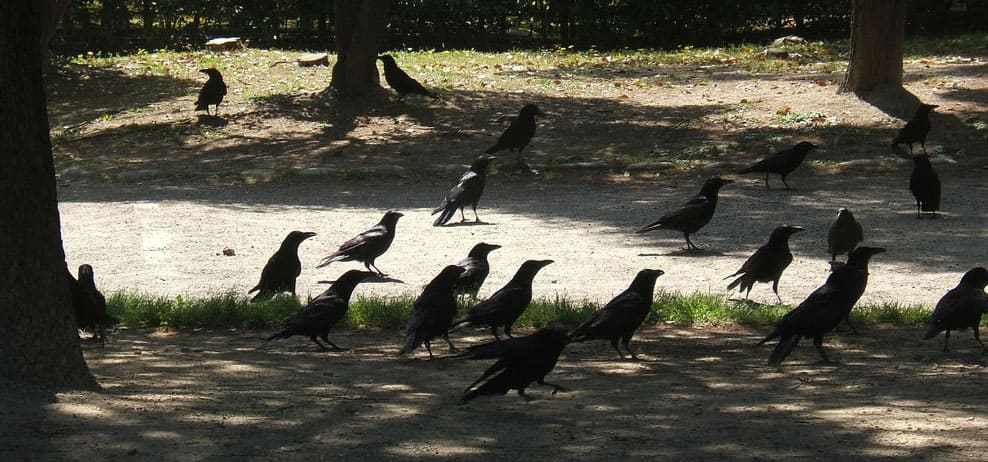
First things first: No, don’t be afraid of crows. Collective nouns emerged during medieval times when they were poetic and colorful in nature.
Did you know that crows are considered to be some of the most intelligent animals in the world?
However, their intelligence is often overlooked. This is because people tend to be unnerved by these birds because of their black feathers, their association with death, and what they’re called when they’re together in a group.
A group of crows is called a murder of crows (which is a little scary but also a little bit un-logical).
However, research has shown that crows are actually very caring and social creatures.
On this page
Why Is a Group of Crows Called a Murder?
A group of crows is called a “murder“. There are many different explanations for where this term came from, most of those being based on superstitions and folk tales. For example, there is an old story that crows will come together so they can decide the destiny of another crow.
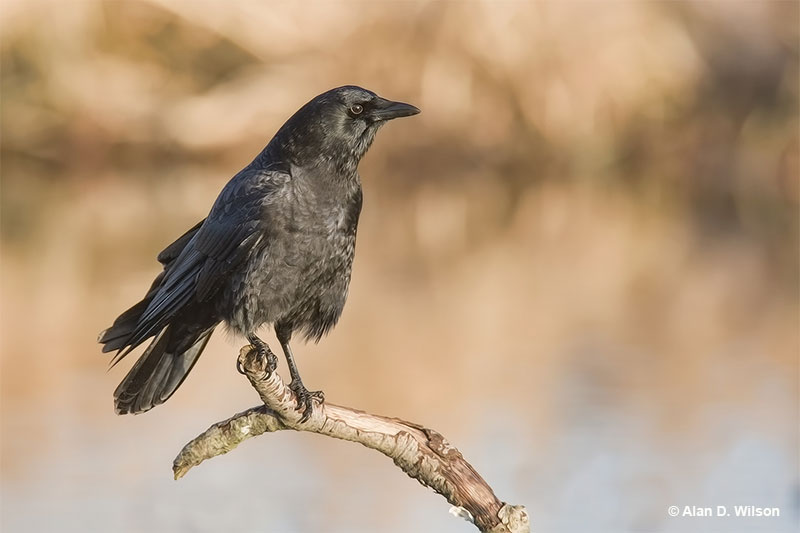
American Crow © Alan D. Wilson
Many associate crows with death due to their black feathers and them being scavengers. They are also associated with battlefields, cemeteries, and dead bodies. People also think they circle in large numbers above sites where people or animals are going to die soon.
Related: Is there a way to attract crows?
Collective nouns emerged during medieval times when they were poetic and colorful in nature. Collective nouns are usually complementary, since they were given based on group perceived qualities. For example, the term “murder” was given to crows based on how they were perceived at the time.
Other Expressions
Crows are very social birds with strong family bonds. They roost together in large numbers, sometimes in the thousands.
While a lot of people call a group of birds a flock, crows have been known by a number of terms.
The most popular term for a group of crows is a murder, but a group of crows can also be called a mob of crows, horde of crows, parcel of crows, or muster of crows.
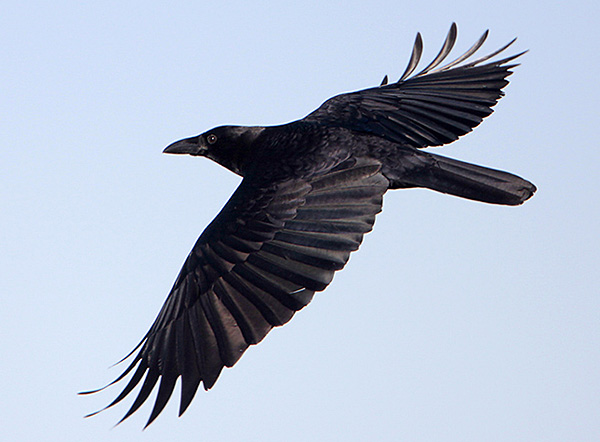
American Crow
No set number of birds is needed to call a group a flock. It depends on the birds social behavior in the group. Since crows naturally congregate in large groups, just a few of them together would not usually be called murder.
Related: The symbolism of black feathers
This is because they are likely to gather into even larger groups. When a flock or large group of crows gather together, they’re known by the poetic term, a murder of crows.
Similarly to crows, ravens are also known for their elaborate terms, such as unkindness or conspiracy of ravens.
Why Do Crows All Gather Together?
There are several reasons why crows gather together; research suggests that big groups of crows provide many benefits. Let’s go over why crows gather together and what purpose it serves them. Firstly, when crows roost together, they’re provided safety due to the sheer number of them.
For those who don’t know what roost means, it’s the gathering of a large number of birds to sleep with one another at night. Crows usually roost in trees that are strong enough to hold a large number of birds.
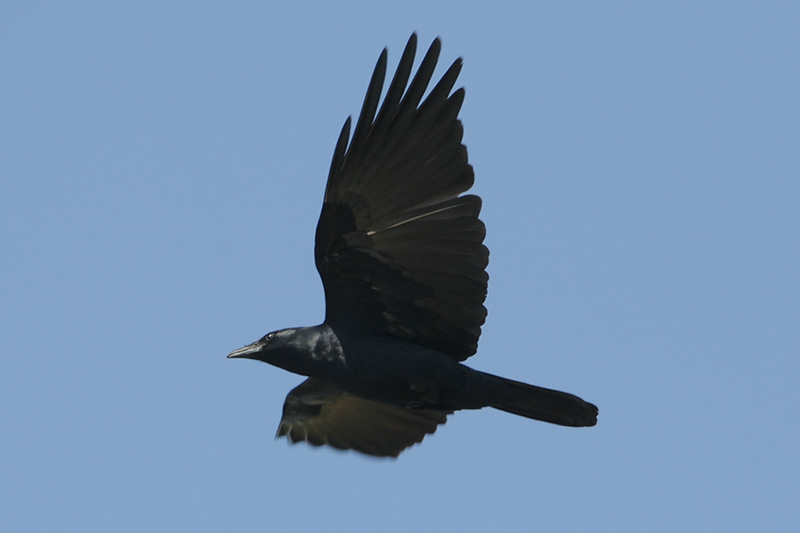
Fish Crow. Photograph © Greg Lavaty.
Next, gathering in big groups helps the crows keep warm. Sleeping close to one another makes it easier to fight off the cold. Sleeping together also provides protection against predators. Eagles, Peregrine Falcons, Great Horned Owls, and Red-Tailed Hawks are all raptors that will go after crows. Roosting together discourages attacks by these predators.
Lastly, crows gathering in big numbers help them find sources of food more efficiently by using the shared knowledge of the group.
To sum everything up, roosting in large numbers provides safety, better access to food sources, and heat during the winter months.
Fun Facts About Crows And Their Habits
- Similarly to crows, ravens, magpies, and jays are members of the Corvid family, which means they are classified into the Corvus genus. They are represented on every continent except for Antarctica.
- One of the reasons why crows form groups or flocks is safety and longevity. By living in a community, they all take care of each other and even help to take care of each other’s young.
- Although often seen as the omen of death, crows are perhaps the most intelligent birds.
- The ‘large black bird’ we know as the crow isn’t black everywhere in the world. Of course, there are other related species, but for example, the crows in Europe are more gray than black.
- There are no certain measurements of their numbers in the United States, but American Crows are widespread, ranging over North America to Canada and even Mexico.
Frequently Asked Questions
What does it mean when hundreds of crows gather?
When hundreds of crows gather together, it’s for a reason. Hundreds of crows will gather together if they’re roosting, grieving, needing to stay warm, feeling in danger, or traveling.
What does it mean when you see a flock of crows?
Contrary to popular belief, crows are actually viewed as good omens when it comes to spiritual symbolism. Crows are believed to represent positive meanings like destiny, intelligence, transformation, mystery, fearlessness, and adaptability.
However, as stated in the last question, crows also gather together for multiple benefits. For example, they gather if they’re roosting, grieving, need to stay warm, feel they’re in danger, or are traveling.
Conclusion
A group of crows is called a murder due to collective nouns being popular during medieval times.
Collective nouns are usually complementary, but the term “murder” was given to crows based on how they were perceived. Crows are omnivores who are known for scavenging. They’ll eat almost anything. Historically, they would appear after disasters, in cemeteries, and on battlefields to snack on the carrion that was left behind.
Their association with death led people to believe crows foreshadowed disaster. Although these birds are misunderstood, they are very social birds with strong family bonds and are highly intelligent. So next time you see a crow, take some time to observe them to see how remarkable these birds genuinely are!
Read Next – Are Birds Mammals?

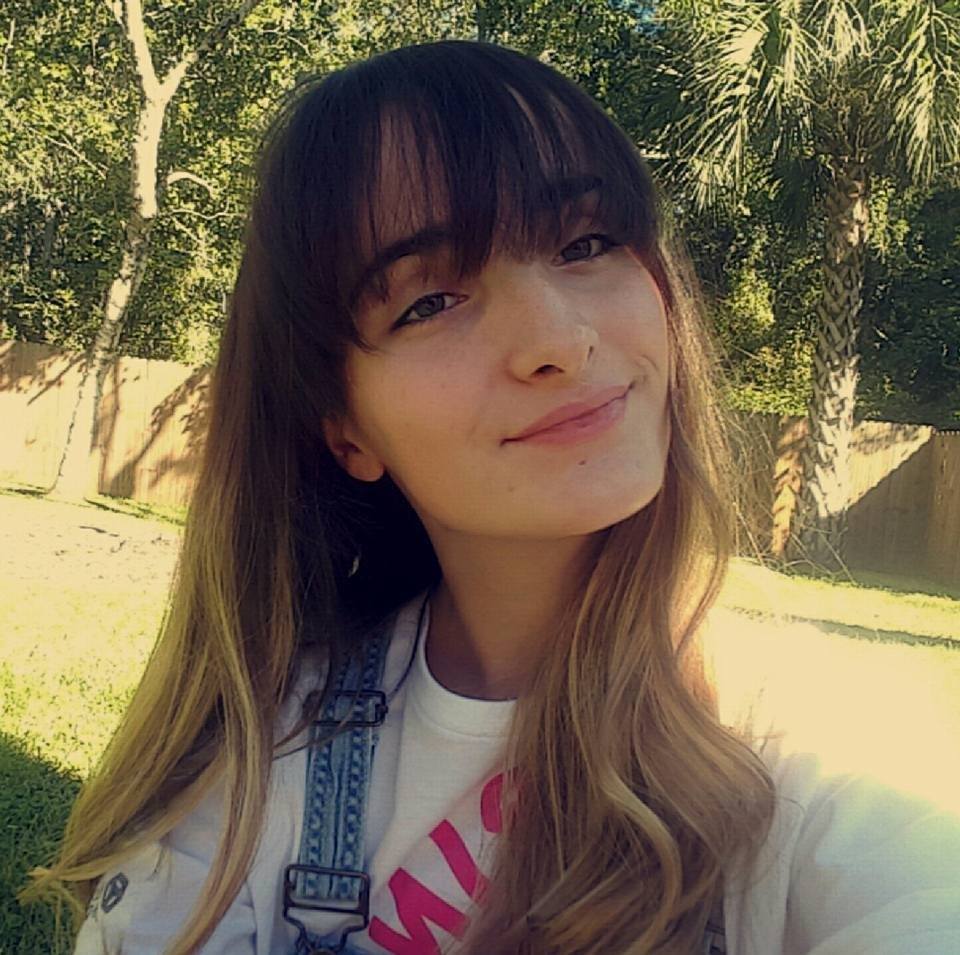
Ann Hardy
Wednesday 24th of May 2023
I have a family group of crows, mum dad & baby, so I call them Cheryl Russell and Baby, they have visited me for about 4 years. If I whistle and they are near enough to hear me the come onto either my roof or the chimney of the house behind me. They quickly snaffle up the bits I throw out for them and leave with a loud skwark which I take for thanks. I love having them visit me, as a child we had many smaller birds visit, an occasional Blackbird being the biggest, but my favourite was a one legged greenfinch, Hoppy! Id sit cross legged on the garden path with a few bread crumbs in front of me,. Hoppy would come down and eat, I kept still so as not to scare him, he came for about 3 years, I'll never know what became of him. We had a cross goldfinch/canary, Sam his father was attacked by a cat and a friend of my grandads rescued him, he bred canaries and put the goldfinch in with his canary hens, clearly it was a male goldfinch as soon after he was released one of the canaries hattched a goldfinch! He gave him to my dad, we had him many years, he loved a bath, this started with him trying to bathe in his water trough so dad bought a bird bath, Sam was in heaven, mum not so much her chair was closest to sams cage and she got a soaking when he had a bath! Another quirk was his taste in seeds dad gave him a wild bird mix but he had his favourites and would dig through his seed pot to find the ones he liked scattering the rest everywhere making such a mess. He had a long happy life, he was such a character I learnt to understand hus different calls and knew what he wanted from his tweets, I was rarely wrong. He didn't like to come out of his cage, he panicked. While he was dads bird, it was me he was closest to he lean up against the bars of the cage for me to stroke him, closing his eyes in bliss, he'd nibble at my fingers gently making little murmering sounds if any one else tried He'd bute hard with his beak. So I became the one to clean and feed him, he died soon after I married and left home but was a good age.